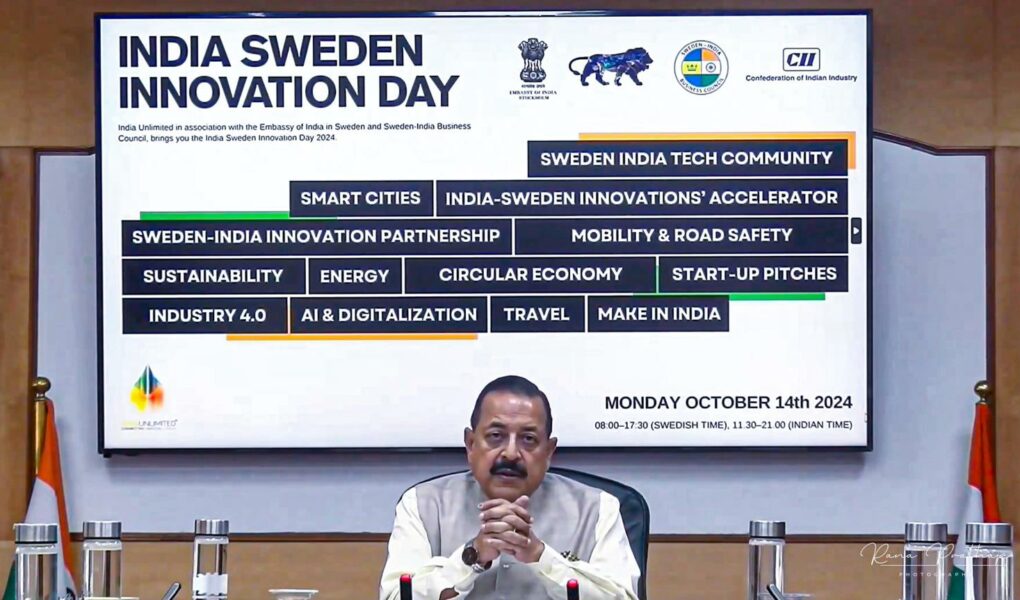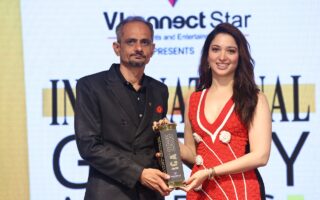New Delhi, October 17th 2024: As global leaders prepare for the COP 29 climate summit, India and Sweden are boosting their collaboration to advance industrial decarbonisation and accelerate the green transition. The India-Sweden Innovation Day 2024 laid crucial groundwork for these endeavours, with both nations reiterating their commitment to report on the progress of their joint green initiatives at COP 30, where the Honourable Prime Ministers of India and Sweden are set to meet.
Delving into the theme, ”Accelerating Green Growth for Inclusive Transition” the 11th edition of the strategic event witnessed a confluence of thought leaders, policymakers, and innovators who are committed to addressing global challenges with cutting-edge innovation.
The event commenced with an engaging session on ‘Co-Creating the Future,’ featuring renowned experts from India and Sweden discussing the role of joint innovation and technological collaboration, allowing both countries to position themselves as key players ahead of the pivotal COP meetings.
Underlining the shared objective and the significant potential of the two nations to emerge as global leaders in innovations, Dr Jitendra Singh, Honourable Minister for Science and Technology, Government of India, said, “Sweden ranks 2nd among 39 European economies and 133 global economies on the Global Innovation Index, while India leads the 10 economies of Central Asia and ranks 39th globally. This highlights the abundant scope for joint research and collaboration between our nations in research, academia, innovation, and industrial entrepreneurship, including startups.
Further reflecting on the collaborative journey between India and Sweden, Chief Guest, H.E. Ebba Busch, Honourable Vice Prime Minister & Minister for Energy and Enterprise, Government of Sweden, said” India, with its young population and fast-growing economy, boasts one of the largest startup ecosystems globally, with over 75,000 startups and 100 unicorns. Alongside Sweden’s global leadership in innovation, this partnership makes us an unbeatable ally as we advance towards our net zero commitments.”
The keynote speeches by H.E. Ebba Busch and Dr. Jitendra Singh underscored the significant impact of the India-Sweden partnership in driving industrial decarbonisation. They also outlined a roadmap of immediate actions for COP 29 and a vision for lasting outcomes at COP 30.
Another leadership panel on ‘Green Growth with Inclusive Transition’ included prominent voices from the public and private sectors, focusing on building a green and inclusive economy. The experts also discussed the integration of sustainability into industrial processes and green manufacturing.
From advancing space exploration to enhancing cooperation in biotechnology for sustainable food and fuels, the 11th edition of India-Sweden Innovation Day emphasised the robust alliance between India and Sweden. The event also emphasised the critical roles of the Sweden-India Business Council (SIBC) and the Confederation of Indian Industry (CII) in strengthening business ties.
These organisations are crucial in understanding market dynamics, community needs, and industry trends, thereby fostering a deeper connection and synergy between the two countries.
Touching on India’s growing significance on the global stage, especially in innovation and technology, H.E. Tanmaya Lal, Secretary West, Ministry of External Affairs, Government of India, said, ”India is rapidly rising in the global innovation landscape. Today, we rank among the top nations in critical technology areas such as AI and biotechnology. With the world’s third-largest startup ecosystem, India is driving economic growth and global innovation. Our collaboration with Sweden, particularly in technology and green transitions, is crucial for addressing global challenges.’’
Echoing his views and reiterating the commitment of both governments to enhance lives across communities through sustainability, H.E. Jan Thesleff, Ambassador of Sweden to India, said, “Team Sweden and our Indian counterparts, including researchers, entrepreneurs, innovators, and policymakers, are working together to achieve a greener future through various initiatives. We are also promoting academic and industrial research, development, and cooperation through jointly funded programs focusing on the circular economy and more.”
Amid the soaring global demand for clean and sustainable energy, countries like Sweden and India are emerging as key players in this transformation. Sweden, renowned for its leadership in renewable energy and sustainability, sees immense potential in partnering with India, a growing force in technology and green solutions, to address pressing energy challenges.
”The Swedish Energy Agency has been actively engaged in India through various collaborations in the public sector, spanning national, city, and state levels. The Confederation of Indian Industry (CII) and the Green Building Centre, with their market connections and community insights, have been valuable in helping us understand India’s trends and industry requirements,” said Ms. Caroline Asserup, Interim Director General, Swedish Energy Agency.
Recalling the unparalleled growth of India-Sweden Innovations’ Accelerator program since 2009, Mr. Ludvig Lindström, Senior Advisor, Swedish Energy Agency underscored the evolution of the platform into a powerful driver of sustainable innovation.
”Our collaboration with India began in 2009, and over time, these efforts have evolved into the India-Sweden Innovation Accelerator program. As of the last count two years ago, the program has facilitated over 250 joint projects. This shift represents a significant milestone; we are no longer just linking businesses but working together to develop solutions that directly contribute to global climate goals,” said Mr. Lindström.
As businesses around the world increasingly acknowledge the need for sustainable practices, industry experts at the event emphasised the significance of integrating sustainability into core business processes.
“The imperatives of sustainability, growth, and competitiveness are no longer independent of one another. In fact, they are deeply intertwined. Being competitive now means being increasingly sustainable, and without sustainability, businesses will find themselves out of the market. While national governments and agencies are driving the global sustainability agenda, it is ultimately the public and private sectors that will deliver solutions on the ground,” said Mr. Kamal Bali, President & MD, Volvo Group India and Co-Chairman, CII Europe Council.
Experts at the 11th edition of India Sweden Innovation Day also laid emphasis on extending the partnership between the two countries, transitioning from association in research and innovation to jointly designing products and bringing them to market.
”India Sweden Innovation Day has become an institution in the relationship between India and Sweden. We have already moved into collaborating on innovating jointly and it is time to the next step and see how we could look at products and get them out in the market together,” said Mr. Robin Sukhia, Secretary General & CEO, Sweden-India Business Council / Chairman, Scandinavian Chemotech.
Another key highlight of the 11th edition of India Sweden Innovation Day was a comprehensive dialogue to explore the future of local manufacturing, opportunities, innovation and a conducive regulatory framework.
”We have been present in India for almost 50 years, engaging in licensed production. Now, we are taking the next step by establishing a state-of-the-art factory for the Carl Gustaf system. We are the first company in the defence industry to be allowed to own 100% of the factory and this will be very important for us in the future, especially if we are looking to expand the production facility,’’said Mr. Mattias Ringman, Vice President, Head of Finance, BA Dynamics, Saab.
Similarly, referring to the incredible opportunities for foreign businesses in India, Ms. Susanne Pulverer, CEO & CSO, IKEA India, said,” IKEA has had its presence in India for more than 40 years and it is also the biggest market where we support development in climate change, etc. Furthermore, it is important to provide equal opportunities for everyone, so we are committed to creating a gender-diverse organisation with a 50-50 gender ratio. Overall, India is a fantastic country and a great opportunity market, and of course, a growing market.’’

During the ‘Strategic Innovations to Accelerate the Decarbonization of Steel and Cement Industries’ panel, experts from India and Sweden explored innovative approaches to reduce emissions in these vital industrial sectors. The discussion highlighted the need for cutting-edge technologies, sustainable practices, and strengthened collaboration between the two nations. Panelists also emphasised policy reforms and regulatory frameworks to support a smooth and efficient transition toward a decarbonised future for India’s steel and cement industries. In addition, according to experts, platforms like Lead IT have proven to be game changers in this regard.
‘’We are fortunate to have become a founding member of Lead IT in 2019. Currently, Lead IT has 36 members, with 6 out of 10 companies hailing from India. Our focus is on how Lead IT can further bridge the gap between different countries. Lead IT is not just a partnership between India and Sweden, but also involves 8 other countries. Our expectation from Lead IT is to become a strong pillar for technology innovation, technology transfer, and creating roadmaps for these crucial factors,’’ said Mr. Mahendra Singhi, Managing Director and CEO of Dalmia Cement.
In the captivating session on ‘Travel as a Business Accelerator,’ panelists shared insights into the transformative impact of travel on global business dynamics. They analysed how strategic travel planning enables access to new markets, fosters partnerships, and drives accelerated business growth.
In addition, a thought-provoking fireside chat on “Sustainability and Innovation” highlighting real-world examples of successful initiatives. This engaging dialogue offered key insights into how businesses can balance profitability with environmental responsibility in an ever-evolving global landscape.
The India-Sweden Innovation Day 2024 also spotlighted the transformative roles of Artificial Intelligence and Smart Cities. Both India and Sweden, with their substantial capabilities in AI and technology, are well-positioned to lead the global movement towards AI-driven sustainable urbanisation. Additionally, circularity in textiles was another major theme discussed, unlocking new possibilities in textile recycling and waste management.
“Working together, India and Sweden can become global leaders and partners in creating sustainable and innovative solutions for the entire planet. From startups to industry transition, we are pioneering initiatives in sustainable energy, safe transport, circular economy, sustainable cities, AI, and Digital transformation. Let us continue to work together and share ideas,’’ said Mr. Sanjoo Malhotra, CEO of India Unlimited.
The India Sweden Innovation Day 2024 was a resounding success, with participants deliberating on the valuable connections made and the collective commitment to cultivating partnerships that can lead to impactful solutions.
As COP 29 approaches, both countries are set to introduce collaborative frameworks and policies that will drive progress in areas such as green manufacturing, energy efficiency, and sustainable urbanisation. The upcoming year before COP 30 will be crucial for translating these strategies into real-world outcomes that align with global climate ambitions.
About India Unlimited
India Unlimited was founded in 2013 to promote cross-cultural ties between India and Sweden in association with the Embassy of India in Sweden and Sweden-India Business Council. In the last seven years, the organisation has hosted a number of events in Stockholm and Gothenburg showcasing the diversity of Indian cultural, economic and social life.
In association with the Indian Embassy in Stockholm, India Unlimited has been a part of events including the visit from the former Indian President, H.E. Shri Pranab Mukherjee and the Swedish Royal family; an exhibition of works by Rabindranath Tagore and Satyajit Ray; business seminars in collaboration with CII and Sweden-India Business Council on subjects ranging from gender and diversity to energy, transportation, smart cities, space, innovation and infrastructure under the Make In India promotion; fashion shows by Vogue India, Tarun Tahiliani and NIFT students; design exhibitions: Pecha Kucha tiger photo exhibition: a film festival with speakers including Aparna Sen, Shonali Bose and Ketan Mehta; an Innovation Hackathon across universities in Sweden; and the day-long festivals – Namaste Stockholm and Namaste Gothenburg in collaboration with Incredible India, that drew thousands to come together and discover the variety and multiculturalism of India.
They were the proud partner and organiser of Stockholm Culture Festival Theme India in 2017, which was attended by 650000 Stockholmers presenting Zakir Hussain, Papa CJ, Bollywood Musical, Yoga, Indian cuisine and much more.




